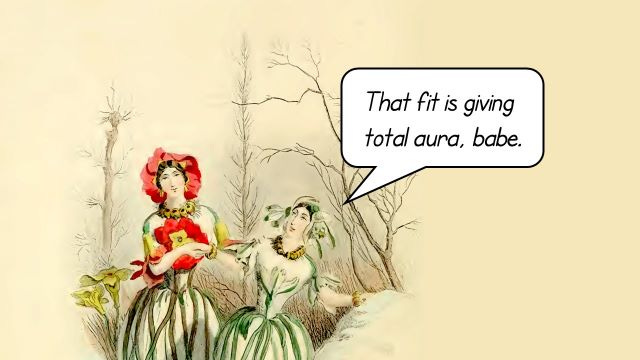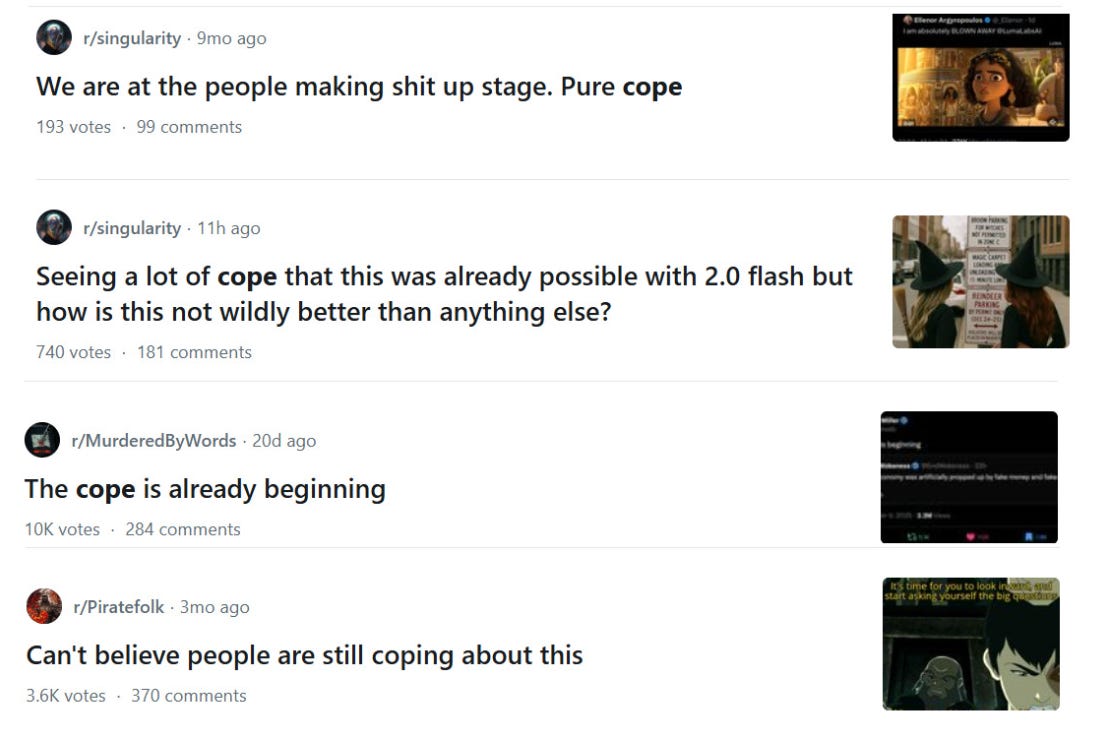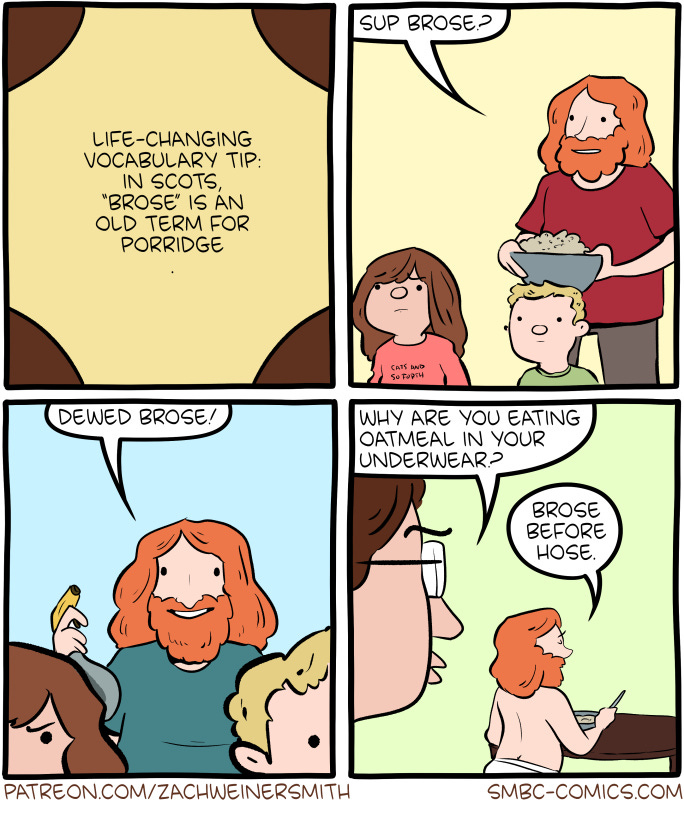- English in Progress
- Posts
- It's been a while, no cap 🧢, What's an anachronym? 🕰️, adults don't get emojis💀
It's been a while, no cap 🧢, What's an anachronym? 🕰️, adults don't get emojis💀

Welcome to the latest instalment of English in Progress, the newsletter that keeps you updated on the English language. Appears in your inbox whenever I have time.
My name is Heddwen Newton, I’m an English teacher and linguist. I love discovering all the ways English is spoken, the ways in which it is used by different generations and by people from all over the world.
Thanks for reading English in Progress! Subscribe for free to receive new posts and support my work.

Great stuff from the past six (!) months
I was gone a long time. I started a new job. My children continued to be the little lovable energy vampires that they are. And, if I’m being honest, the longer I waited to publish a new issue, the more daunting publishing a new issue became. But I’m back, and it is thanks in a large part to Grammar Girl, a.k.a. Mignon Fogarty, who was kind enough to invite me to be a guest on her podcast. A few people said they loved it, I felt like perhaps this silly slang-watching thing I do is something people actually like, and so I pushed myself to just push it out, a new issue, a bit like a baby (though far less painful).
(If you are curious what I look like, there’s a YouTube video of the podcast. Watch me side-eye my notes and talk faster and faster as panic sets in, while Mignon remains calm and collected like the fricking professional that she is.)
Here’s the most important stuff from the past six months:
The words of the year 2024
In my opinion, the best words-of-the-year vote (or WOTY for those in the know) is the American Dialect Society one. (I am not American, so national pride has nothing to do with it.) I tend to be less interested in the winner than in the shortlists, which are packed full of fun new words. Some of my favourites this year were “tariffied: afraid of the consequences of excessive tariffs” (a bit prescient, if you ask me), “broligarchy: political structure controlled by a small group of powerful men”, and “to hold space: to create a safe space for a person, concept, or thing; to be present without judgment”. Full list here. (For the other WOTYs, Elle Australia did a good roundup.)
‘Footage’ is an anachronym
In the early days of silent movies, the physical reels of film would be measured in feet. One foot of film (30.48 cm) equalled about a second of action on the screen. ‘Footage’, then, was a length of film. Nowadays, most video makers use digital devices, but recorded video material is still called ‘footage’. This is an example of an anachronym; a word that is used anachronistically.
I have fallen in love with the type of anachronym that, like ‘footage’, refers to older technology that is no longer necessarily being used. Other examples are ‘to dial a phone number’, ‘to cut and paste’ on a computer, your email ‘inbox’, and to ‘tune into’ a podcast. I made a list, put it on Bluesky, it went slightly viral, and lots of people contributed more of them, which I kept on adding to my list. In the end I had 33 anachronyms, four metaphors that are a bit anachronym-y, and eight ‘skeuomorphs’ (visual anachronisms, like a lamp that looks like a candle, and the little bow on the front of ladies’ underpants that harks back to the time when you would pull the strings and lace it up). Read the whole list here.
Netflix series Adolescence has a teenager schooling a police officer on ‘coded’ messages
The miniseries Adolescence has had rave reviews, and deservedly so. In the series, emojis are used as coded messages, but the adults don’t realise this until the son of one of the police officers enlightens him. I won’t reveal which emojis are used for what, as that would be spoilers, but this Cosmopolitan article reveals all.
This may sound worrying, but linguists Lauren Gawne and Jessica Kruk argue that adults shouldn’t be overly concerned about teen language like emoji and slang.
(Btw, my favourite ‘innocent’ misunderstood emoji is the 💀, which to me would mean ‘death’, or maybe ‘I’m a pirate’, but to young people means something is funny, and they are ‘dying from laughter’.)
Young non-Americans are saying ‘zee’ instead of ‘zed’
Younger Brits increasingly say “zee” instead of “zed,” a shift driven by American media. Linguists say it’s a global, generational trend. One more sign of ageing for those feeling out of touch. Language Hat
Gen Z/alpha slang
Slang used by mostly Gen Z (born 1996 to 2010, more or less) and sometimes Gen Alpha (born 2010 to 2024). Click on the word to see where I got it from.
New slang
Slang that is new, newly popular, or zeitgeist-y
Girl canon event - a defining moment in a woman’s life, often something relatable and awkward, that ends up shaping who she is. On TikTok, young women are sharing theirs, like “you try to fix a guy and he ends up ruining your life” or “falling out with the girl you thought was going to be your maid of honor.” (‘canon event’ has been on Urban Dictionary since 2023; ‘girl canon event’ is not (yet) on there)
FAFO - short for ‘f*ck around and find out’. This phrase has been part of English slang for a while, used to describe people making reckless or foolish choices and then facing the fallout. The abbreviation FAFO (pronounced “eff-ay-eff-oh”) is currently popular as a standalone term. It’s often used to describe MAGA supporters dealing with the negative consequences of policies enacted by the Trump administration. (‘FAFO’ has been on Urban Dictionary since 2017)
Cope (noun) - a coping mechanism or self-delusion one clings to in order to endure a hopeless situation. Originally incel slang, this one has just, in my opinion, crossed the border into more mainstream English, especially in tech-circles. As the last Reddit title below shows, the noun has now been verbed. ‘I can’t believe people are still coping about this’ means something like ‘I can’t believe people are still upset about this’. (On Urban Dictionary since 2019)

Popular slang
Slang that has become part of regular English for young adults (to celebrate Merriam-Webster’s excellent new ‘slang’ tab, almost all links lead to there this month)
aura: ‘cool’ factor; star power; stylish swagger (On Urban Dictionary with this definition since 2006)
brainrot: material of low or addictive quality, typically in online media, that preoccupies someone to the point it is said to affect mental functioning. Both the state of preoccupation and resulting mental degradation are known as brain rot. (On Urban Dictionary with this definition since 2023)
chat - used to address people. It’s both singular and plural. It’s both second and third person. Everybody, regardless of the size of the intended audience, is chat. Example: “Chat, can you believe this?” (On Urban Dictionary since 2023)
fit - outfit, clothes (On Urban Dictionary since 2004)
to be giving something - to strongly give off the impression of something, usually a mood, character, or aesthetic. Example: “Your ponytail is giving CEO.” (On Urban Dictionary since 2020)
to glaze - to praise excessively. Example: “He’s not that cute, stop glazing him!” (On Urban Dictionary since 2022)
no cap - for real, seriously. Example: “That was the best pizza ever, no cap” (On Urban Dictionary since 2016)
Miscellaneous slang
Not new enough for the first category, not popular enough for the second category, but interesting nonetheless.
baka - idiot (often said playfully; “sussy baka” is something like “silly billy”). Originally Japanese, this word stems from anime. (On Urban Dictionary since 2002, still on teachers’ ban lists today)
the Goomba fallacy - the mistaken belief that when two contradictory opinions appear on the same internet forum, it reflects badly on the entire community. Named after a popular meme in which a Goomba (an enemy mushroom in Super Mario computer games) is looking shifty and stupid while falling victim to the fallacy. (On Urban Dictionary since 2024)
type shit - (also spelled "type s.," "type shi," or "type shiii") affirms or emphasizes a previous statement, often implying agreement, relatability, or interest; may be short for "that's the type of shit I'm talking about" (On Urban Dictionary with this meaning since 2019)
Neologisms
My admittedly subjective criterion for words to make this list is that they seemed new and interesting to me. Click on the word for more information. Big thanks to the Words of the Week segment at the end of the podcast Because Language, and the Cambridge New Words Blog.
4B movement - a social movement originating in South Korea that calls on women to stop dating, marrying or having children as a stand against gender inequality and societal pressures
coffee badging - the practice of employees clocking in for a brief period at the office, typically long enough to grab a coffee, before departing to work from elsewhere
doom spending - buying things, especially online, to help cope with anxiety caused by unsettling global events and an uncertain future.
Frankenshoe - a shoe that is a combination of two or more very different styles
LLM grooming - the deliberate manipulation of large language models (LLMs) by flooding their training data with disinformation
mattress run - the activity of booking and paying for a hotel room you don’t need to allow you to earn points or rewards on its loyalty programme
threenager - a moody and strong-willed toddler
shouse - a type of home where a large workshop is attached to the living area (perhaps it is because I speak German, but this really strikes me as a terrible way to refer to a house)
Words around the world
In this section, I highlight some words and terms from the richness of the English-speaking world that came to my attention in the past weeks. Click on the word for more information.
only - Indian English uses the word “only” to add emphasis, such as in the phrase “we are like this only”. A listener from the west might get the impression that Indian English is peppered with the word “only” where it does not carry any meaning, but it does; it’s a direct translation from Indian languages such as Hindi. It is difficult to “translate” the word back to western English, but perhaps something like “indeed” or “in particular”.
Veronica bucket - Ghanaian English for a bucket with a tap at the bottom, mounted at the right height for people to wash their hands. Important especially, in places without running water, to sanitise hands during the Covid pandemic. Named after its inventor, Veronica Bekoe, and added to the Oxford English Dictionary in December 2024.
Yahoo boy - Nigerian English for a person (esp. a man) who commits fraud on the internet. In use since at least 2005 (hence the reference to web portal Yahoo which was founded in 1994), added to the Oxford English Dictionary in December 2024.
yarn dusting - Nigerian English for talking nonsense. (From ‘to spin a yarn’) In use since at least 2004, added to the Oxford English Dictionary in December 2024.
And finally…
And finally, a funny video or stupid joke that I found on social media.
First, some nice semantics from Zach Wienersmith

Second, on 1 April, gaming hardware producer Razer introduced its new product ‘Razer Skibidi’, the world’s first intelligent brainrot translator headset.
The number of mistakes in this newsletter is directly proportionate to the number of times my four-year-old woke me up last night. If you want to give me any feedback (always much appreciated!), you can use the comment button below, or hit reply.
I used very limited AI to create this newsletter, just to help me find the right phrasing once or twice. All articles were chosen, read and summarised by a human being, namely me :-)
The comic was made using an out-of-copyright book illustration that I found on Flickr.
Special thanks to my nephew Q who keeps me updated on Gen Z slang.